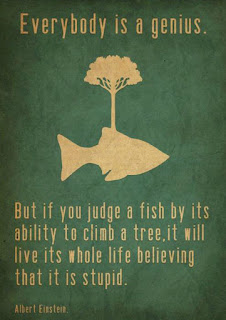Students are running around the room, stepping on number cards. Shouts are occurring across the room. "Where is eight?" "What number are you looking for?" What appears to be a chaotic classroom turns out to be an environment filled with life lessons. This is Mrs. Rushing's Experiential Learning class where she teaches all students in Kindergarten through 8th grade lessons on life and character.
In Experiential Learning (EL), Mrs. Rushing facilitates a learning experience that almost always appears to be a fun game or activity. Today's lesson is about communication, synergy, and helping each other, although the students will not figure this out until the end. She instructs the students to work as a group to step on a set of numbered cards in sequential order as quickly as possible. To make things a challenge, the numbered cards are randomly dispersed around the room.
After the first round, Mrs. Rushing asks students to reflect on the experience by asking, "What did you notice?" Students raise their hands, eager to respond. "Everyone was so loud, I couldn't hear anything." "There were only a few students who would help you." "It took some people a lot longer than others." "It was hard to find the number you needed because they were all over the place." They are then asked to think of possible strategies to make the challenge faster. She doesn't agree or disagree with the ideas, but allows the students to process the suggested strategies. The group sets a goal for improvements (a throwback to last week's EL lesson on goal setting) and then allows time to problem solve before restarting the experience.
On round two, the room is less disorganized, but again filled with smiling students bumping into each other. Yells continue to fill the air. The group implements their system for finding numbers. Hands are raised in the air with numbers, students are looking out for each other. They complete the challenge more quickly and are visibly proud of their accomplishment. When discussing round 2, Mrs. Rushing asks the class to think about how their ideas worked and what could be done differently. They are then asked to relate those lessons to school. Students pipe in, "We should ask for help when we need it." "Or if you see someone who looks lost, just offer to help them."
The bell is about to ring and Mrs. Rushing asks the most important question of the entire lesson, "What did you learn today?" Fifth grade student Shelandee sums up the lesson by saying, "People may not know you need help if you do not ask." "And when you help each other, it's a lot easier to get the job done," adds Shelby Brooks.
But the lessons are more than asking for helping, or offering help to those who need it. That may be the obvious goal accomplished, but experiential learning is more. In this one class period, students step outside their comfort zone. They are allowed the freedom to move around the room, get loud, interact with each other, and think outside the box. They solve problems and learn to make mistakes in safe environment. They experience how to make eye contact while speaking and how to disagree without being disagreeable. According to Mrs. Rushing this is the biggest benefit of Experiential Learning. "Kids do not have a lot of opportunities to solve problems in life without some sort of adult intervention- from a parent, teacher, or coach. It takes a couple of lessons before they realize that no one is going to tell them the solution. My class teaches students how to think on their own and how to collaborate with others. We shouldn't wait until they are adults to learn these skills."
Experiential Learning is an addition to Union Academy thanks to Dr. Walters. "I believe Experiential Learning works hand in hand with our school's charter of developing the whole child. It is an intentional approach to develop skills for life success that are not part of the regular curriculum. Learning to work with others, develop compassion, and how to reflect on life's lessons are just a few of the benefits we expect to see through EL." According to Mrs. Rushing, that is the beauty of her lessons. "Because the group dynamics determine the final outcome, you never really know exactly what will be taught and it may be different for each child. I can teach this lesson six times and walk away with each group learning something slightly different, all just as important." For instance in this activity, one class walked away thinking about how important it is to ask for help and to offer help to those who look lost. Another group reflected on how important it is brainstorm with each other and to plan before jumping into an activity. "Those unexpected lessons are just as important, or sometimes more important, than any that I may have planned."
In a few short weeks, Experiential Learning has already demonstrated it's usefulness. It is an excellent example of how UA defines character to include thinking, feeling, and doing (Principle 2 of the 11 Principles of Character Education) and how UA has a comprehensive, intentional, and proactive approach to teaching competencies needed for real-world success (Principle 3).
Chart above from http://www.joe.org/joe/2007february/a2fig1.jpg










.jpg)







